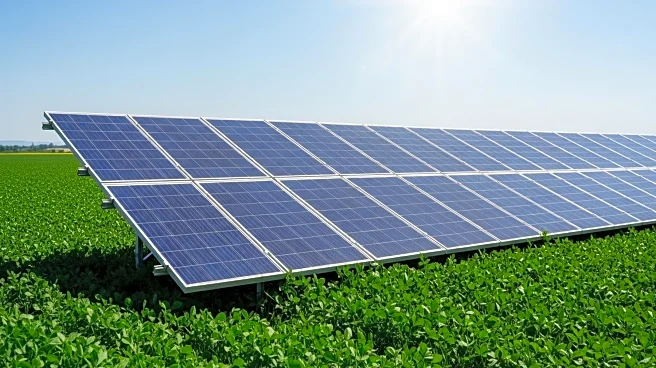What is the story about?
What's Happening?
Researchers from Technische Hochschule Ingolstadt in Germany have created a crop selection tool designed to optimize agrivoltaics projects across 25 countries. This tool analyzes the response of 12 staple crops to climatic changes, growth conditions, and shading, while considering their water and space requirements. Agrivoltaics, which combines agriculture with solar energy, aims to maximize crop yields and sustainability. The study found that crops such as vegetables, berries, and fruit trees benefit from the protection offered by solar panels, which shield them from extreme weather and reduce water evaporation. The tool uses Global Horizontal Irradiance data to identify optimal growth conditions in solar energy zones, enhancing food security and energy efficiency.
Why It's Important?
The development of this tool is significant as it addresses the dual challenge of food security and renewable energy production. By optimizing agrivoltaics, farmers can achieve higher returns on investment and contribute to sustainable practices. The ability to sell excess energy generated from solar panels back to the grid offers an additional revenue stream, making agrivoltaics not only profitable but also environmentally beneficial. This approach conserves land and water resources, providing a viable solution for small-scale farming communities and decentralized renewable energy projects. As the demand for sustainable agriculture grows, agrivoltaics could play a crucial role in transforming farming practices globally.
What's Next?
Future research is expected to focus on AI-driven optimization techniques and real-world pilot studies to refine decision-making in agrivoltaics deployment. Advanced agronomic assessments will further enhance the tool's effectiveness, potentially leading to widespread adoption of agrivoltaics. As more agricultural operations seek to reduce electricity costs and optimize crop growth, the popularity of agrivoltaics is likely to increase, driving innovation and sustainable development in the farming sector.
Beyond the Headlines
The integration of solar energy with agriculture presents ethical and cultural dimensions, as it promotes sustainable practices and supports rural development. By reducing reliance on conventional energy sources, agrivoltaics contribute to environmental conservation and climate change mitigation. This approach also fosters community resilience by providing farmers with additional income opportunities and enhancing food security.
















